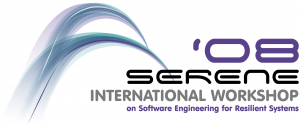International Workshop
on Software EngineeRing for rEsilieNt systEms
November 17-19, 2008
Newcastle upon Tyne (UK)
http://serene2008.uni.lu
You can download the Call For Papers CallForPapers-SERENE2008.
PURPOSE
The SERENE 2008 workshop is an international forum for researchers and practitioners interested in the advances in Software Engineering for Resilient Systems. SERENE 2008 views resilient systems as open distributed systems that have capabilities to dynamically adapt, in a predictable way, to unexpected and harmful events, including faults and errors. Engineering such systems is a challenging issue which needs urgent attention from and combined efforts by people working in various domains. Achieving this objective is a very complex task, since it implies reasoning explicitly and in a consistent way about systems functional and non-functional characteristics.
SERENE advocates the idea that resilience should be explicitly included into traditional software engineering theories and practices and should become an integral part of all steps of software development. As current software engineering practices tend to either capture only normal behaviour, or to deal with all abnormal situations only at the late development phases, new software engineering methods and tools need to be developed to support explicit handling of abnormal situations through the whole software life cycle. Moreover, every phase of the software development process needs to be enriched with the phase-specific resilience means.
SCOPE
The following constitutes a list of the key software engineering domains that the SERENE workshop will focus on. This list should not, however, be considered as closed or technically restrictive:
Formal and semi-formal modelling of resilience properties
Re-engineering for resilience
Software development processes for resilience
Requirement engineering processes for resilience
Model Driven Engineering of resilient systems
Verification and validation of resilient systems
Error and fault handling in the software life-cycle
Resilience through exception handling in the software life-cycle
Frameworks and design patterns for resilience
Software architectures for resilience
Component-based development and resilience
System structuring for resilience
Atomic actions
Dynamic resilience mechanisms
Resilience prediction
Resilience metadata
Reasoning and adaptation services for improving and ensuring resilience
Intelligent and adaptive approaches to engineering resilient systems
Engineering of self-healing autonomic systems
Dynamic reconfiguration for resilience
Run-time management of resilience requirements
CASE tools for developing resilient systems.
TYPES OF CONTRIBUTION
Technical papers: Original work addressing the topics targeted by the workshop can be submitted as technical papers. It may be theoretical or conceptual papers. Advanced “work in progress” paper might be considered for submission too.
Experience/Industry papers: Contributions of in-depth description of practitioner experience reports or case studies within the scope of SERENE are invited. Submissions should include sufficient information regarding the application domain and the lessons learnt.
PhD Forum papers: We encourage Ph.D. students to submit paper that present their objectives, methodology, and results mainly at an early stage in their research. The PhD forum session should provide a critical but supportive and constructive environment in which discussions about the subject are encouraged. It aims to provide useful guidance for the dissertation research.
Project papers: Short papers describing ongoing projects related to SERENE topics are welcome. Such papers shall highlight the main goals of the project and the achieved results.
Tool papers: Papers presenting new tools or new versions of the existing tools that support the development of resilient systems can be submitted to this session. Commercial as well as open source tools are to be considered.
Two dedicated sessions on formal methods for resilience and on resilience-explicit development are planned. We specifically encourage submissions to these sessions from the partners of two major EC ICT projects: ReSIST (http://www.resist-noe.org/) and DEPLOY (http://deploy-project.eu/).
